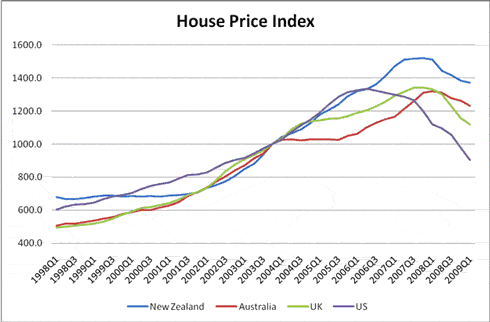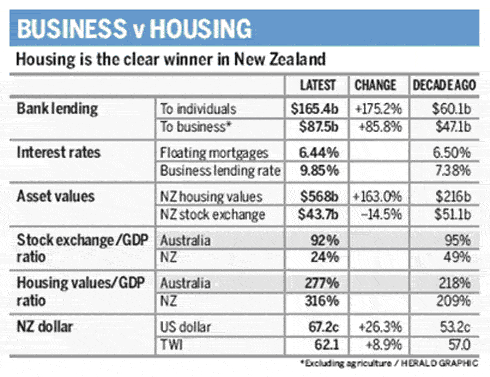 By John Walley Finance Minister Bill English has recognised the dangers of a recovery led by housing and consumption. He has also indicated a willingness to take the necessary steps to avoid one. Based on past experience a Capital Gains Tax is at the top of the list of initiatives that politicians would like to avoid, but the obvious imbalance in our economy is compelling evidence that a shift to a broader, more balanced tax base is necessary. Even the Government appointed Buckle tax review looks likely to recommend a Capital Gains Tax. One of the arguments against introducing such a tax centres on the fact that other countries which have a Capital Gains Tax already have still suffered a housing boom. While this is the case, New Zealand's boom has been the worst.
By John Walley Finance Minister Bill English has recognised the dangers of a recovery led by housing and consumption. He has also indicated a willingness to take the necessary steps to avoid one. Based on past experience a Capital Gains Tax is at the top of the list of initiatives that politicians would like to avoid, but the obvious imbalance in our economy is compelling evidence that a shift to a broader, more balanced tax base is necessary. Even the Government appointed Buckle tax review looks likely to recommend a Capital Gains Tax. One of the arguments against introducing such a tax centres on the fact that other countries which have a Capital Gains Tax already have still suffered a housing boom. While this is the case, New Zealand's boom has been the worst.
 New Zealand's increase in prices has outpaced those of our competitors. As Brian Gaynor illustrated in this table in the Herald, this investment in housing has had a pronounced affect on investment in business.
New Zealand's increase in prices has outpaced those of our competitors. As Brian Gaynor illustrated in this table in the Herald, this investment in housing has had a pronounced affect on investment in business.  Bank lending to businesses has grown at less than half the rate of lending to individuals and investment in the stock exchange is particularly telling. As the earlier graph showed, Australia has also experienced a housing boom, but better balance as a result of their Capital Gains Tax means that business there has not suffered to the same extent. There has been a lot of talk over the years about how a Capital Gains Tax is unpalatable to voters, however, more investment in productive activity creating more and better jobs, increasing incomes, more affordable housing and reduced personal tax rates as a result of the broader tax base all sound like very politically salable ideas. In the January 2009 Register of Pecuniary Interests of Members of Parliament 65 out of the 122 MPs owned two properties or more, so perhaps this is a more pressing reason for the persistent reluctance to deal with our asset tax haven. Putting aside self interest is always difficult, we will see. ____________ * John Walley is the CEO of the New Zealand Manufacturers and Exporters Association.
Bank lending to businesses has grown at less than half the rate of lending to individuals and investment in the stock exchange is particularly telling. As the earlier graph showed, Australia has also experienced a housing boom, but better balance as a result of their Capital Gains Tax means that business there has not suffered to the same extent. There has been a lot of talk over the years about how a Capital Gains Tax is unpalatable to voters, however, more investment in productive activity creating more and better jobs, increasing incomes, more affordable housing and reduced personal tax rates as a result of the broader tax base all sound like very politically salable ideas. In the January 2009 Register of Pecuniary Interests of Members of Parliament 65 out of the 122 MPs owned two properties or more, so perhaps this is a more pressing reason for the persistent reluctance to deal with our asset tax haven. Putting aside self interest is always difficult, we will see. ____________ * John Walley is the CEO of the New Zealand Manufacturers and Exporters Association.
We welcome your comments below. If you are not already registered, please register to comment
Remember we welcome robust, respectful and insightful debate. We don't welcome abusive or defamatory comments and will de-register those repeatedly making such comments. Our current comment policy is here.